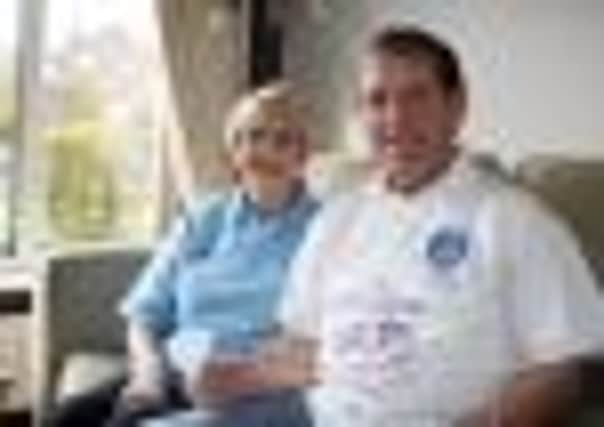Robert’s gift of new life came from his wife


WHEN a life-threatening kidney disease caused Robert Rayner’s health to rapidly deteriorate, his wife Betty made the life-changing decision to give him one of her own kidneys.
Now, 11-years-on, the couple from Sheffield are preparing to compete in the annual Westfield Health British Transplant Games in Belfast, for the ninth year running.
Advertisement
Hide AdAdvertisement
Hide Ad“Before the transplant, his kidneys had become so enlarged that each one weighed 7lb, causing his body to swell up dramatically,” explains Betty 68.
“The dialysis treatment meant his diet had to change – he could only consume 500ml of fluid every day, including things like gravy or custard. It was a nightmare.”
Robert was born with Polycystic Kidney Disease, a hereditary disorder which causes multiple cysts to develop in the kidneys, leading to massive swelling. The condition is the most common genetic life-threatening disease, affecting an estimated 12.5 million people worldwide.
Yet it wasn’t until the age of 29 that the symptoms of Robert’s disease began to show. As a keen runner, Robert led an active lifestyle, frequently taking part in marathons throughout the UK. He worked full-time in a busy Sheffield foundry and spent his spare time socialising with friends. But as his health started to deteriorate – so did his quality of life. “It began with high blood pressure,” said the 57-year-old stepfather-of-two, “I started to get really tired and my energy levels just slumped.” The extreme fatigue continued for years and as the health of his kidneys worsened, the levels of creatinine in Robert’s blood increased.
Advertisement
Hide AdAdvertisement
Hide Ad“Because of the high levels of creatinine in my body, I started to suffer from itchiness and a loss of appetite,” he said. “I just wasn’t myself and eventually I had to begin dialysis in 1996. At first I was having two-and-a-half hours of treatment in hospital three time a week” said Robert. “At its worst, I was having to endure at least four hours of it. We had to convert one of our bedrooms into a dialysis room and I was forced to change my diet dramatically to fit in with the treatment.”
By 1998, Robert was unable to consume more than 500ml of fluid a day or eat anything containing potassium.
“It was hell. My body was so weak. I’d gone from running marathons to being unable to walk to the end of our path. Because my kidneys weren’t functioning I became anaemic and my bones became weaker because the calcium wasn’t getting through. At one point I wasn’t passing urine at all.”
After two years of waiting for a kidney donor, Robert’s condition was getting worse by the day and they knew something had to be done.
Advertisement
Hide AdAdvertisement
Hide Ad“It was terrible seeing the state of his health, so I decided to look into becoming a live donor. Because of the development of the anti-rejection drugs we did not need to be a perfect tissue match and after having the tests we were found to be a near enough match. We couldn’t believe it.”
Within months, the couple underwent the procedure. “It all went so smoothly,” said Robert. “My body immediately recognised Betty’s kidney as my own and I was able to pass urine for the first time in months. The pain, the tiredness, the weakness, it all stopped overnight. Betty had given me a whole new lease of life.”
And three months later, Robert was out running again and decided to enter the Transplant Games as soon as he could. “I immediately joined the Sheffield team and by August, I was competing in the 1,500m race and the 5k mini-marathon. I’ve never looked back.”
Since 2000, Robert has competed in the Games every year accompanied by Betty who became team manager in 2002.
Advertisement
Hide AdAdvertisement
Hide Ad“Having a transplant not only changes a life – it saves a life. I was lucky finding a match in Betty, but some people aren’t as blessed,” said Robert.
SIGN UP TO THE ORGAN DONOR REGISTER
DIALYSIS provides an artificial replacement for lost kidney function in people with renal failure, removing waste and excess water from the body artificially, by circulating blood outside of the body and filtering the substances like a fully-functioning kidney would. Three people die every day waiting for a donor organ, because there simply aren’t enough people signing up to the register. It’s such a simple thing to do, but it means so much to the tens of thousands of people who are waiting for a transplant across the UK. To add your name to the NHS Organ Donor Register, visit http://www.organdonation.nhs.uk